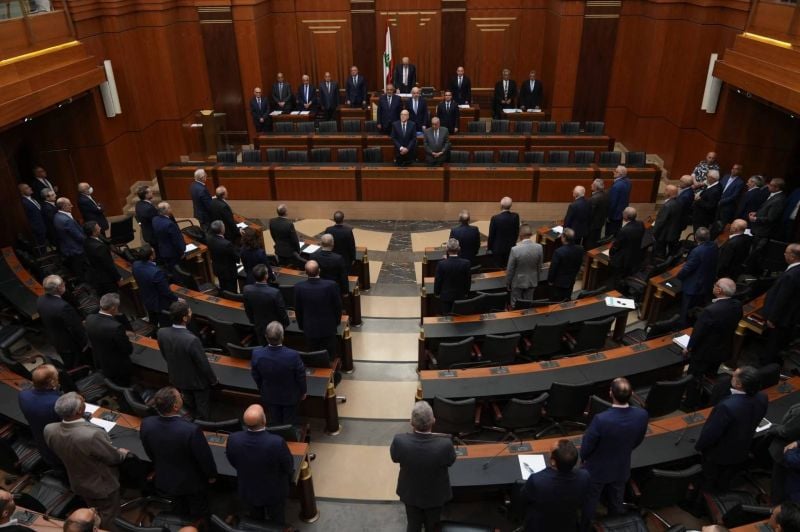
The Lebanese Parliament on April 25, 2024. (Credit: Mohammad Yassine/L'Orient-Le Jour)
Halfway through the term of the parliament elected in May 2022, calls for early legislative elections are becoming increasingly frequent. For some, it is a way of breaking the deadlock in the presidential elections, as the twelve parliamentary sessions held so far to elect a head of state have failed to produce a result against the backdrop of a narrow majority in the current parliamentary makeup.
For others, the organization of an early election should take place after the presidential election, so that Lebanon can equip itself with a new parliament to accompany the future president and the first government of his term, at a time when the future of the region as a whole is being shaped. But is this “solution” feasible at a time when the nation's MPs have just postponed, for the third year running, municipal elections until 2025 to avoid a popularity test deemed ill-timed? Secondly, are the constitutional and legal conditions for such a ballot met, or is this an attempt at distraction?
In general, the decision to call an early general election is understood as a means of ending a political deadlock. It can also result from the dissolution of parliament. In practical terms, the first step towards an early vote is an amendment reducing the legislature. “I can't see the current parliament taking such a decision,” former Interior Minister Ziyad Baroud told L'Orient-Le Jour. He believes that, in the current context, the call for early legislative elections is merely “a way of filling the dead time until the time comes to elect the future head of state after the end of the war in Gaza.” This impression is all the more realistic given that Hezbollah continues to link the election to the war in the South.
'Hezbollah has nothing to lose'
On a strictly local level, Hezbollah and its camp are blocking the deadline by provoking a lack of quorum at the end of each first round of voting, in the hope of ensuring the election of a president who would enjoy their approval. Ironically, it is mainly figures gravitating in the orbit of Hezbollah and its ally the Amal Movement who are impatient and pressing for an early ballot that could, in their view, result in a parliament with a clear majority that could lead a successor to Michel Aoun in Baabda.
Such is the case of Parliamentary Deputy Speaker Elias Bou Saab, who, from the rostrum of Ain al-Tineh, has increased his calls for early legislative elections in the wake of parliamentary sessions dedicated to the presidential election. More recently, Faysal Karame, a Tripoli MP close to Hezbollah, proposed, at a meeting with the ambassadors accredited in Beirut of the member countries of the quintet involved in the Lebanese dossier (United States, France, Saudi Arabia, Egypt, Qatar), early legislative elections with amendments to the electoral law. The parliamentarian is proposing the enlargement of certain constituencies, particularly in his northern fiefdom. North Lebanon II (Sunni majority Tripoli and Minieh-Dennieh) would merge with North Lebanon III (Christian majority Zgharta, Bcharre, Koura and Batroun). It also proposes two preferential votes (instead of one) applied at the level of the constituency as a whole. “We want to modify the electoral law to have different results, to preserve the interest of the approach and to be able to break the current deadlock on the presidential election,” according to an individual close to Karame.
Except, contrary to the latter's expectations, the Christians are currently rejecting any amendment to the current legislation, as Lebanese Forces spokesperson Charles Jabbour points out. “They will not accept a law providing for two preferential votes,” said Baroud. This attitude is explained by the fact that a switch to two preferential votes, especially in mixed constituencies, would give majority communities the final say in the choice of elected representatives, at the expense of several smaller groups, including Christians. This would complicate Karame's task. But why would Hezbollah's allies venture down this path at the risk of alienating the Christians? “Today, Hezbollah has nothing to lose. And it wants to try to win back the majority. Especially as the opposition camp has made several mistakes over the past two years," said political scientist Karim Mufti. “In view of Parliament's inability to elect a president, Hezbollah could see the option of early legislative elections as a way of putting the blame for the deadlock back on its detractors. The party could well accuse the latter of rejecting any possibility of a solution, including early elections," he added.
The Rifi surprise
Unexpectedly, Tripoli MP Ashraf Rifi, a politician staunchly opposed to Hezbollah, made a similar call during a televised interview on Saturday in which he said that elections should be held after the election of a president.
“At a time when the region is going through great changes, a new parliament must accompany the new phase,” he said, claiming that his position had not been coordinated beforehand with the rest of the opposition components. According to Rifi, regional changes will come at the expense of the moumanaa. “It is therefore not normal for Shiite parliamentary representation to remain monopolized by the Amal-Hezbollah duo,” he stressed.
However, things are a long way off before any new elections might be held. “By the time an early ballot is organized, the general parliamentary elections scheduled for 2026 will already be upon us,” noted Mufti.
This article originally appeared in French in L'Orient-Le Jour.
